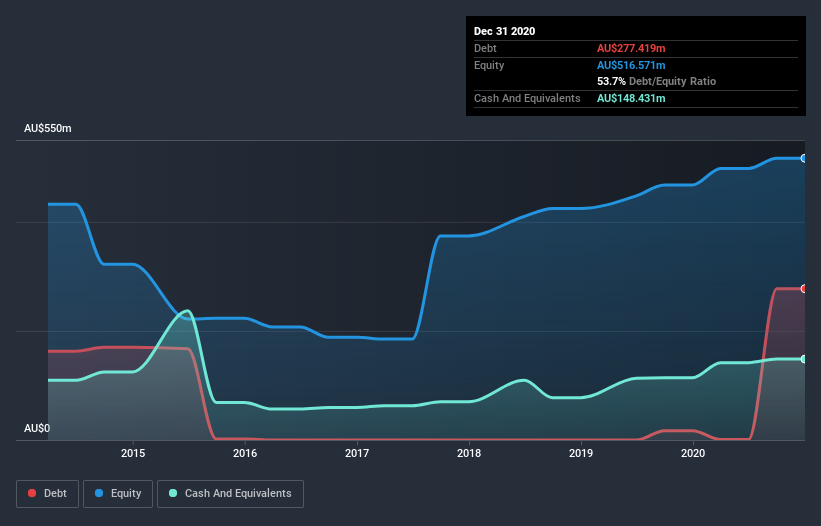These 4 Measures Indicate That Macmahon Holdings (ASX:MAH) Is Using Debt Reasonably Well
Legendary fund manager Li Lu (who Charlie Munger backed) once said, 'The biggest investment risk is not the volatility of prices, but whether you will suffer a permanent loss of capital.' So it might be obvious that you need to consider debt, when you think about how risky any given stock is, because too much debt can sink a company. We can see that Macmahon Holdings Limited (ASX:MAH) does use debt in its business. But should shareholders be worried about its use of debt?
Why Does Debt Bring Risk?
Debt and other liabilities become risky for a business when it cannot easily fulfill those obligations, either with free cash flow or by raising capital at an attractive price. If things get really bad, the lenders can take control of the business. While that is not too common, we often do see indebted companies permanently diluting shareholders because lenders force them to raise capital at a distressed price. By replacing dilution, though, debt can be an extremely good tool for businesses that need capital to invest in growth at high rates of return. When we examine debt levels, we first consider both cash and debt levels, together.
Check out our latest analysis for Macmahon Holdings
What Is Macmahon Holdings's Net Debt?
You can click the graphic below for the historical numbers, but it shows that as of December 2020 Macmahon Holdings had AU$75.5m of debt, an increase on AU$17.1m, over one year. But on the other hand it also has AU$148.4m in cash, leading to a AU$72.9m net cash position.
A Look At Macmahon Holdings' Liabilities
Zooming in on the latest balance sheet data, we can see that Macmahon Holdings had liabilities of AU$269.4m due within 12 months and liabilities of AU$216.4m due beyond that. On the other hand, it had cash of AU$148.4m and AU$212.3m worth of receivables due within a year. So its liabilities outweigh the sum of its cash and (near-term) receivables by AU$125.0m.
Macmahon Holdings has a market capitalization of AU$513.2m, so it could very likely raise cash to ameliorate its balance sheet, if the need arose. However, it is still worthwhile taking a close look at its ability to pay off debt. Despite its noteworthy liabilities, Macmahon Holdings boasts net cash, so it's fair to say it does not have a heavy debt load!
If Macmahon Holdings can keep growing EBIT at last year's rate of 19% over the last year, then it will find its debt load easier to manage. The balance sheet is clearly the area to focus on when you are analysing debt. But it is future earnings, more than anything, that will determine Macmahon Holdings's ability to maintain a healthy balance sheet going forward. So if you're focused on the future you can check out this free report showing analyst profit forecasts.
Finally, while the tax-man may adore accounting profits, lenders only accept cold hard cash. While Macmahon Holdings has net cash on its balance sheet, it's still worth taking a look at its ability to convert earnings before interest and tax (EBIT) to free cash flow, to help us understand how quickly it is building (or eroding) that cash balance. During the last three years, Macmahon Holdings generated free cash flow amounting to a very robust 86% of its EBIT, more than we'd expect. That positions it well to pay down debt if desirable to do so.
Summing up
While Macmahon Holdings does have more liabilities than liquid assets, it also has net cash of AU$72.9m. The cherry on top was that in converted 86% of that EBIT to free cash flow, bringing in AU$48m. So we don't think Macmahon Holdings's use of debt is risky. There's no doubt that we learn most about debt from the balance sheet. However, not all investment risk resides within the balance sheet - far from it. These risks can be hard to spot. Every company has them, and we've spotted 2 warning signs for Macmahon Holdings (of which 1 is a bit unpleasant!) you should know about.
If you're interested in investing in businesses that can grow profits without the burden of debt, then check out this free list of growing businesses that have net cash on the balance sheet.
This article by Simply Wall St is general in nature. It does not constitute a recommendation to buy or sell any stock, and does not take account of your objectives, or your financial situation. We aim to bring you long-term focused analysis driven by fundamental data. Note that our analysis may not factor in the latest price-sensitive company announcements or qualitative material. Simply Wall St has no position in any stocks mentioned.
Have feedback on this article? Concerned about the content? Get in touch with us directly. Alternatively, email editorial-team (at) simplywallst.com.

